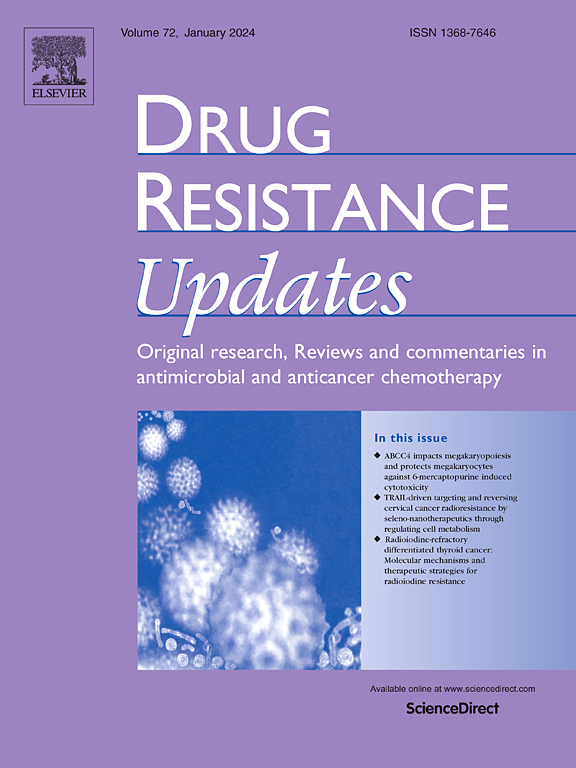Targeted therapy in acute myeloid leukemia: Resistance and overcoming strategy
IF 21.7
1区 医学
Q1 PHARMACOLOGY & PHARMACY
引用次数: 0
Abstract
Acute myeloid leukemia (AML) is an aggressive hematological malignancy characterized by uncontrolled proliferation of immature myeloid blasts, leading to hematopoietic suppression and bone marrow failure. Advances in understanding the pathogenesis of AML have fueled the development of precision medicine approaches, with notable successes in targeting specific mutant proteins (e.g., FLT3, IDH1, IDH2), apoptotic regulators (e.g., BCL-2, MCL1), and cell-surface antigens (e.g., CD33, CD123, CD47). These targeted inhibitors exhibit moderate antileukemic activity as monotherapies and their clinical responses are often limited due to the emergence of drug resistance and disease relapse. Nevertheless, synergistic effects have been observed when these agents are combined with conventional chemotherapy or oncogenic pathway inhibitors. This review analyzes the current limitations of targeted therapies and explores multifaceted resistance drivers, encompassing on-target mutations, compensatory signaling pathway activation, drug-efflux mechanisms mediated by metabolic enzymes or transporters, intrinsic adaptive changes, and interactions with the tumor microenvironment. Corresponding therapeutic counterstrategies are also examined, such as mutation-specific molecular targeting, combinatorial suppression of alternative pathways, disruption of intrinsic adaptive responses, and immunotherapeutic approaches. These evolving interventions aim to overcome specific resistance mechanisms and reduce relapse rates. Future research integrating these strategies holds significant promise for addressing persistent challenges in AML management, ultimately advancing treatment paradigms and patient survival.
急性髓系白血病的靶向治疗:耐药性和克服策略
急性髓细胞白血病(AML)是一种侵袭性血液系统恶性肿瘤,其特征是未成熟髓细胞不受控制的增殖,导致造血抑制和骨髓衰竭。了解AML发病机制的进展推动了精准医学方法的发展,在靶向特定突变蛋白(如FLT3、IDH1、IDH2)、凋亡调节因子(如BCL-2、MCL1)和细胞表面抗原(如CD33、CD123、CD47)方面取得了显著成功。这些靶向抑制剂作为单一疗法表现出中等的抗白血病活性,由于出现耐药性和疾病复发,它们的临床反应往往受到限制。然而,当这些药物与常规化疗或致癌途径抑制剂联合使用时,已观察到协同效应。本文分析了目前靶向治疗的局限性,并探讨了多方面的耐药驱动因素,包括靶突变、代偿信号通路激活、代谢酶或转运体介导的药物外排机制、内在适应性变化以及与肿瘤微环境的相互作用。相应的治疗对策也进行了研究,如突变特异性分子靶向、替代途径的组合抑制、内在适应性反应的破坏和免疫治疗方法。这些不断发展的干预措施旨在克服特定的耐药机制并降低复发率。整合这些策略的未来研究对于解决AML管理中持续存在的挑战具有重要的前景,最终推进治疗范式和患者生存率。
本文章由计算机程序翻译,如有差异,请以英文原文为准。
求助全文
约1分钟内获得全文
求助全文
来源期刊

Drug Resistance Updates
医学-药学
CiteScore
26.20
自引率
11.90%
发文量
32
审稿时长
29 days
期刊介绍:
Drug Resistance Updates serves as a platform for publishing original research, commentary, and expert reviews on significant advancements in drug resistance related to infectious diseases and cancer. It encompasses diverse disciplines such as molecular biology, biochemistry, cell biology, pharmacology, microbiology, preclinical therapeutics, oncology, and clinical medicine. The journal addresses both basic research and clinical aspects of drug resistance, providing insights into novel drugs and strategies to overcome resistance. Original research articles are welcomed, and review articles are authored by leaders in the field by invitation.
Articles are written by leaders in the field, in response to an invitation from the Editors, and are peer-reviewed prior to publication. Articles are clear, readable, and up-to-date, suitable for a multidisciplinary readership and include schematic diagrams and other illustrations conveying the major points of the article. The goal is to highlight recent areas of growth and put them in perspective.
*Expert reviews in clinical and basic drug resistance research in oncology and infectious disease
*Describes emerging technologies and therapies, particularly those that overcome drug resistance
*Emphasises common themes in microbial and cancer research
 求助内容:
求助内容: 应助结果提醒方式:
应助结果提醒方式:


